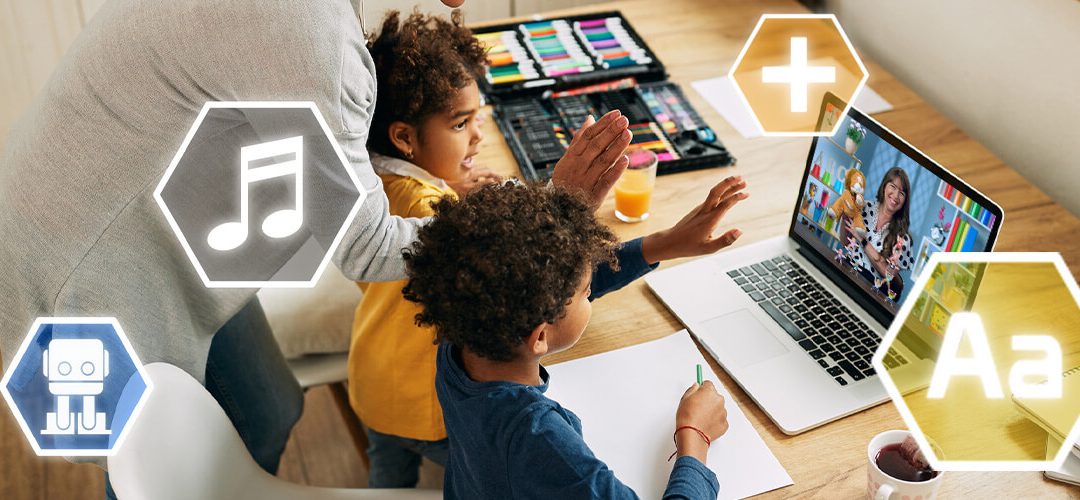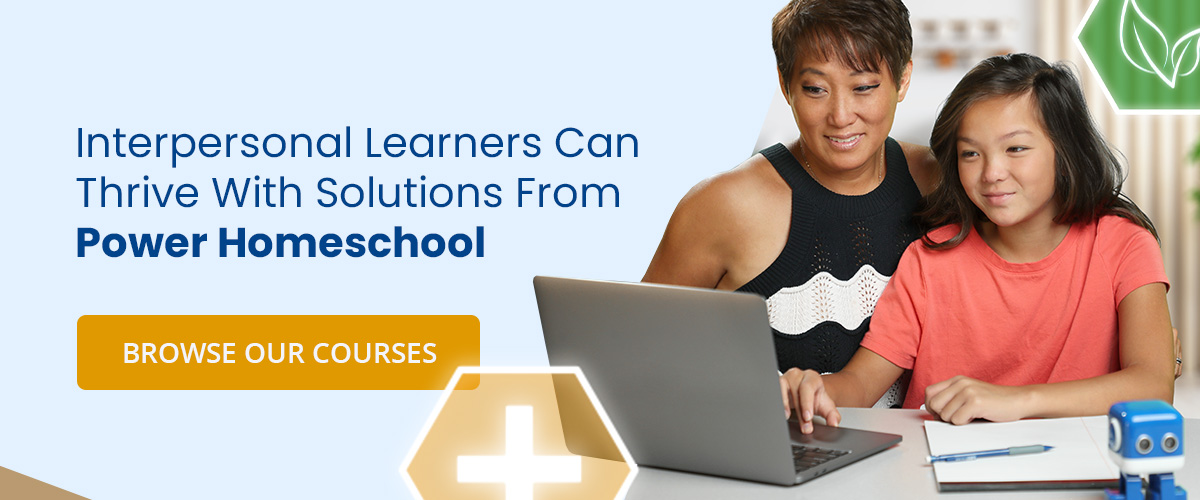Every child learns and retains information differently. While some teachers may use a one-size-fits-all approach, awareness of different learning styles allows instructors to accommodate diverse learning styles and implement practices that accommodate students’ needs. This guide explores the interpersonal learning style and how homeschooling parents can help social learners stay engaged.
What Is Interpersonal Learning?
Interpersonal learning occurs when someone understands information more effectively through verbal and nonverbal communication and interactions. These interpersonal learners, also called social learners, enjoy school activities such as group work, debates, class discussions, speech and drama. Here are some of the most prominent characteristics of interpersonal learners.
- Natural leaders: Social learners are good at interpreting other people’s tones and gestures to navigate social interactions, resolve conflicts and manage group projects.
- Strong communication skills: Since interpersonal learners are eager to understand others, activities requiring plenty of participation and interaction are easier for them to handle.
- Courageous: These learners are very vocal and often speak up when they need feedback.
- Activity seekers: Interpersonal learners feel more motivated and engaged when doing class activities or discussing topics in a group.
How Interpersonal Learning Differs From Other Learning Styles
Recognizing your child’s learning style can make you a better homeschool teacher by allowing you to use teaching practices and resources that help them learn best. Here’s how other learning styles might differ from interpersonal learning.
- Visual: Students with the visual or spatial-visual learning style are excellent at understanding and processing visual information. They may remember lessons by analyzing pictures, diagrams and videos.
- Auditory: Auditory learners are naturally good listeners. Due to their affinity for patterns and repetition, some may also acquire information best through sounds, rhythms and singing.
- Kinesthetic: This physical learning style allows students to obtain and understand information by actively solving problems, being active or skillfully manipulating objects by hand.
Strengths and Weaknesses of Interpersonal Learning
An interpersonal learner typically has the following strong suits.

- Effective communication skills: Interpersonal learners may have high verbal skills that allow them to speak confidently, steadily and coherently, encouraging people to want to listen.
- Strong teamwork capabilities: These students tend to promote meaningful discussions and idea exchange, helping everyone in the group contribute and collaborate effectively.
- Empathy and emotional intelligence: Social learners’ listening skills and empathy allow them to easily connect with others and build stronger relationships with peers.
As a homeschooling parent, you can lessen the impact of the following shortcomings with the appropriate teaching practices and lesson plans.
- Potential for distraction: Some social learners struggle to balance social interactions with focused individual study or learning time. They benefit from techniques that can help them minimize distractions and create a balance.
- Dependence on group activities: Because social learners enjoy group work, they might rely on these activities to improve their academic performance. However, homeschooling often includes fewer group assignments than a physical school. You can facilitate study groups and lesson discussions to help your child maintain steady academic performance.
- Challenges with solitary tasks: Solitary tasks may cause social learners to become distracted or discouraged. Look for effective strategies to minimize this challenge.
Practical Tips for Teaching Interpersonal Learners
As a parent of an interpersonal homeschool student, encourage practices that align with their learning style to keep them engaged. Here are some things you can do to enrich your child’s experience.
- Encourage group work: When working through an assignment or classroom material, encourage your student to work in a team with others, engaging and sharing their opinions on the topic.
- Promote role-playing: Role-play allows social learners to apply what they’ve learned to real-world situations. It encourages them to assume a particular character and understand viewpoints and circumstances from a different perspective.
- Set up study groups: Encourage your child to form a study group where they can regularly revise their work. The group can help them understand their work better and know what questions to ask if they need clarity on a topic.
- Create field trips: If possible, give your student hands-on experiences to reinforce what they learn in school. You could arrange opportunities for older students to interview professionals in careers that interest them or enroll them in an online workshop.
- Encourage presentations: Assigning your child to create presentations on specific topics allows them to share their knowledge confidently and receive feedback for improvement.
- Incorporate educational community service: Having your student participate in community service projects related to the lessons they learn in school will give them firsthand knowledge.
How to Support Your Social Learner in a Homeschool Environment
As a homeschooling parent, here are a few ways you can help your student thrive.
- Join a homeschool support group: Homeschooling can make a social student feel lonely. A support or study group allows your child to freely interact with other students whenever they need to brainstorm on an assignment or make new friends.
- Choose a curriculum that matches your student’s learning style: If possible, evaluate different curricula and choose one that caters to their learning style. For instance, they may prefer various opportunities to socialize.
- Sign up for extracurricular activities and social clubs: Arrange for your student to participate in after-school social clubs and extracurricular activities that allow them to expand their knowledge on educational subjects.
- Encourage virtual collaboration: Your child can use videoconferencing tools like Zoom and Google Meet to collaborate and communicate with other students.
Interpersonal Learners Can Thrive With Solutions From Power Homeschool
When you incorporate the correct practices, homeschooling an interpersonal learner can enhance their leadership, teamwork and communication skills. Power Homeschool offers resources, tools and other support options that may assist homeschooling parents and students.
Power Homeschool is the official provider of Acellus® courses for homeschooling parents. We offer the flexibility to choose from hundreds of Acellus® courses and allow students to work through them at their pace and on their schedule. We welcome you to browse our courses and other resources today.



